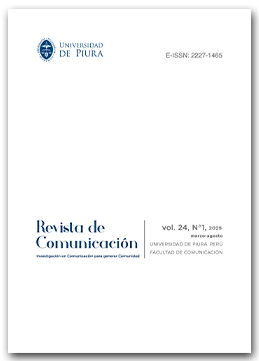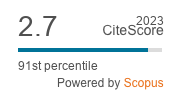Psychosocial factors associated with the desire to leave the media industry in Ecuador, Peru, and Venezuela
DOI:
https://doi.org/10.26441/RC24.1-2025-3697Keywords:
psycho-social risks, mass media, journalism, healthAbstract
Working conditions in Latin American media have been impacted by various crises such as the Covid-19 pandemic, political-social violence and the economic crisis. For this reason, we are interested in determining the demographic and psychosocial factors that influence the decision to stop working in the media. In a sample of 288 journalists from Ecuador (34.4%), Peru (28.1%) and Venezuela (37.5%), two ad-hoc surveys were applied: one for demographic variables and the other for psychosocial risk/protection factors. Bivariate analyses were carried out to compare those who want to leave their jobs with those who do not, and it was found that those who want to leave their jobs are characterized by being young, women, residing in capital, have received more threats of dismissal, workplace harassment, feel that their health has worsened and negatively evaluate their bosses. Workers who do not wish to change jobs experience significantly more intimidation and political confrontation. In addition, binary logistic regression found that being older, residing in Venezuela, and presenting greater political confrontation are protective factors. Poor internet connectivity, perceiving a greater impact on their health, and negatively valuing the concern they perceive from their immediate bosses are risk factors. These results are discussed in relation to the importance of psychosocial risk prevention to improve the retention of workers in the media in contexts of multisystemic crises.
Metrics
References
Álvarez, L., Aguilar, A., & Guadarrama, J. (2022). Reality of journalists in the central area of Ecuador in time of pandemic. Tsafiqui - Revista Científica En Ciencias Sociales, 12(19). https://doi.org/10.29019/tsafiqui.v12i19.1043 DOI: https://doi.org/10.29019/tsafiqui.v12i19.1043
Asociación Nacional de Periodistas del Perú. (9 de enero de 2023). Manifiesto de la ANP frente al actual contexto político y social. https://anp.org.pe/manifiesto-de-la-anp-frente-al-actual-contexto-politico-y-social/
Barriga-Medina, H. R., Campoverde-Aguirre, R., Coello-Montecel, D., Ochoa-Pacheco, P., & Paredes-Aguirre, M. I. (2021). The Influence of Work–Family Conflict on Burnout during the COVID-19 Pandemic: The Effect of Teleworking Overload. International Journal of Environmental Research and Public Health 2021, Vol. 18, Page 10302, 18(19), 10302. https://doi.org/10.3390/IJERPH181910302 DOI: https://doi.org/10.3390/ijerph181910302
Beam, R. A. y Spratt, M. (2009). Managing vulnerability: Job satisfaction, morale and journalists’ reactions to violence and trauma. Journalism Practice, 3(4), 421-438. https://doi.org/10.1080/17512780902798653 DOI: https://doi.org/10.1080/17512780902798653
Becerra, M. (2014). Medios de comunicación: América Latina a contramano. Nueva Sociedad. https://nuso.org/articulo/medios-de-comunicacion-america-latina-a-contramano/
Bernadas, J. M. A. C., & Ilagan, K. (2020). Journalism, public health, and COVID-19: some preliminary insights from the Philippines. Https://Doi.Org/10.1177/1329878X20953854, 177(1), 132–138. https://doi.org/10.1177/1329878X20953854 DOI: https://doi.org/10.1177/1329878X20953854
Berkowitz, D. (2019). Reporters and their sources. In K. Wahl-Jorgensen & T. Hanitzsch (Eds.), The Handbook of Journalism Studies. 2nd Edition (pp. 165-179). New York: Routledge. DOI: https://doi.org/10.4324/9781315167497-11
Burgos, E. (2023). La censura digital en Venezuela: autoritarismo digital y vigilancia estatal en tiempos de COVID-19. Revista Invecom, 3(1), 131–148. http://www.revistainvecom.org/index.php/invecom/article/view/413
Bustamante-Granda, B. F., Rodríguez-Hidalgo, C., Cisneros-Vidal, M. A., Rivera-Rogel, D., & Torres-Montesinos, C. (2021). Ecuadorian journalist’s mental health influence on changing job desire: A cross sectional study. International Journal of Environmental Research and Public Health, 18(19), 10139. https://doi.org/10.3390/ijerph181910139 DOI: https://doi.org/10.3390/ijerph181910139
Bustamante-Granda, B. F., Carrión-Salinas, G., & Velázquez, A. (2022). Estilos de afrontamiento al estrés por covid-19 en periodistas ecuatorianos. Los nuevos materiales de comunicación y salud. Ed U. Cuesta., A. Barrientos-Cuesta & L. Martínez-Martínez. Fragua.
Bustamante-Granda, B. F., Torres-Montesinos, C., Cisneros-Vidal, M. A., Rivera-Rogel, D & Rodríguez-Hidalgo, C., (2023). Análisis de la salud mental de los periodistas durante la pandemia de COVID-19 en Ecuador, Perú y Venezuela. CEDIA. https://doi.org/10.48661/T7M7-C571
Camponez, C., & Oliveira, M. (2021). Jornalismo em Contexto de Crise Sanitária: Representações da Profissão e Expectativas dos Jornalistas. Comunicação E Sociedade, 39, 251–267. https://doi.org/10.17231/comsoc.39(2021).3178 DOI: https://doi.org/10.17231/comsoc.39(2021).3178
Confederación de Empresarios de Aragón (17 de abril de 2018). Riesgos psicosociales en medios de comunicación. https://ceoearagon.es/noticias/riesgos-psicosociales-en-medios-de-comunicacion/
Cotter, C. (2010). News Talk Investigating the Language. Queen Mary University of London Journalism. https://doi.org/10.1017/CBO9780511811975 DOI: https://doi.org/10.1017/CBO9780511811975
Chávez, R. (31 de diciembre de 2022). ANP registró 303 ataques a la libertad de prensa durante el año 2022. ANP Alertas. https://anp.org.pe/anp-registro-303-ataques-a-la-libertad-de-prensa-durante-el-ano-2022/
Freedom House. (2021). Venezuela: Freedom in the World 2021 Country Report. https://freedomhouse.org/country/venezuela/freedom-world/2021
Fonner, K. L., & Roloff, M. E. (2012). Testing the Connectivity Paradox: Linking Teleworkers’ Communication Media Use to Social Presence, Stress from Interruptions, and Organizational Identification. Communication Monographs, 79(2), 205–231. https://doi.org/10.1080/03637751.2012.673000 DOI: https://doi.org/10.1080/03637751.2012.673000
Fundamedios. (2022). Jornadas de violencia generalizada y sistemática vivió la prensa ecuatoriana durante el paro. https://www.fundamedios.org.ec/wp-content/uploads/2022/07/INFORME-COMPLETO-AQUÍ-1.pdf
Fundamedios. (2023). Informe elecciones 2023. Asesinatos, atentados y balaceras los nuevos actores de las elecciones en Ecuador. https://www.fundamedios.org.ec/wp-content/uploads/2023/02/INFORME-ELECCIONES-2023-1.pdf
Gottfried, J., Mitchell, A., Jurkowitz, M., & Liedke, J. (2022). Older, younger journalists differ in views of work, use of social media. Pew Research Center. https://www.pewresearch.org/journalism/2022/06/14/older-journalists-most-content-in-their-work-younger-journalists-more-likely-to-find-social-media-helpful/
Grohmann, R., Nonato, C., Marques, A. F., & Acosta Camargo, C. (2021). As Estratégias de Comunicação das Plataformas de Trabalho: Circulação de Sentidos nas Mídias Sociais das Empresas no Brasil. Comunicação e Sociedade, 39, 17–37. https://doi.org/10.17231/comsoc.39(2021).2879 DOI: https://doi.org/10.17231/comsoc.39(2021).2879
Gutiérrez-Coba, L. L. (2020). Professional situation and job satisfaction of Colombian journalists. Comunicacion y Sociedad (Mexico), 2020, 1–26. https://doi.org/10.32870/CYS.V2020.7556 DOI: https://doi.org/10.32870/cys.v2020.7556
Hilbrecht, M., Shaw, S. M., Johnson, L. C., & Andrey, J. (2008). ‘I'm home for the kids’: contradictory implications for work–life balance of teleworking mothers. Gender, Work & Organization, 15(5), 454-476. DOI: https://doi.org/10.1111/j.1468-0432.2008.00413.x
Le Cam, F., Pereira, F. H., & Ruellan, D. (2021). Violencia pública contra periodistas y medios de comunicación: Introducción. Sobre el periodismo, About journalism, Sobre el periodismo, 10(1), 6-9. DOI: https://doi.org/10.25200/SLJ.v10.n1.2021.433
López-García, J. M., Adorno Ocampos, E. A., & Cárdenas Areco, A. B. (2021). Estrés percibido por docentes de nivel escolar básico y medio del Paraguay durante la pandemia de Covid-19. Revista Virtual de La Sociedad Paraguaya de Medicina Interna, 67–75. https://doi.org/10.18004/rvspmi/2312-3893/2021.08.02.67 DOI: https://doi.org/10.18004/rvspmi/2312-3893/2021.08.02.67
Macías, R. A. G., & Robledo, D. A. C. (2021). Trabajar por amor al arte: precariedad laboral como forma de violencia contra los periodistas en México. Global Media Journal México, 18(34), 209–228. https://doi.org/10.29105/gmjmx18.34-10 DOI: https://doi.org/10.29105/gmjmx18.34-10
Mann, S., & Holdsworth, L. (2003). The psychological impact of teleworking: stress, emotions and health. New Technology, Work and Employment, 18(3), 196–211. https://doi.org/10.1111/1468-005X.00121 DOI: https://doi.org/10.1111/1468-005X.00121
Miret, M. (2021). La salud mental de los periodistas se resiente por los efectos de la pandemia. Cuadernos de Periodista, 42, 31-43. https://dialnet.unirioja.es/servlet/articulo?codigo=7981899
Mouratidis, K., & Papagiannakis, A. (2021). COVID-19, internet, and mobility: The rise of telework, telehealth, e-learning, and e-shopping. Sustainable Cities and Society, 74, 103182. https://doi.org/10.1016/J.SCS.2021.103182 DOI: https://doi.org/10.1016/j.scs.2021.103182
Press Emblem Campaing. (2022a). Countries with the most Covid-19 related journalist deaths. Countries with the Most Covid-19 Related Journalist Deaths. https://pressemblem.ch/-1.shtml
Press Emblem Campaing. (2022b). PEC annual report. Ukraine and Mexico most dangerous countries in 2022 for journalists. Press Emblem Campaign. https://pressemblem.ch/pec-news
Periodistas sin Cadenas. (2021). Despidos masivos de periodistas en Ecuador. Periodistas Sin Cadenas. https://www.periodistassincadenas.org/despedidos-masivos-periodistas-ecuador/
Prieto, M. B. (2021). Censura de medios y supervivencia del régimen en Venezuela: Comillas Journal of International Relations, 20(20), 17–30. https://doi.org/10.14422/CIR.I20.Y2021.002 DOI: https://doi.org/10.14422/cir.i20.y2021.002
Reporteros Sin Fronteras. (2022). Ranking 2022. Clasificados de mejor a peor situación de la libertad de prensa. https://rsf.org/es/classement/2022/américa
Reporteros Sin Fronteras. (2024). Clasificación Mundial de la Libertad de Prensa RSF 2024 Análisis General: El periodismo, bajo las presiones políticas. https://www.rsf-es.org/clasificacion-mundial-de-la-libertad-de-prensa-rsf-2024-analisis-general-el-periodismo-bajo-las-presiones-politicas/
Sardeshmukh, S. R., Sharma, D., & Golden, T. D. (2012). Impact of telework on exhaustion and job engagement: a job demands and job resources model. New Technology, Work and Employment, 27(3), 193–207. https://doi.org/10.1111/J.1468-005X.2012.00284.X DOI: https://doi.org/10.1111/j.1468-005X.2012.00284.x
Suh, A., & Lee, J. (2017). Understanding teleworkers’ technostress and its influence on job satisfaction. Internet Research, 27(1), 140–159. https://doi.org/10.1108/INTR-06-2015-0181/FULL/XML DOI: https://doi.org/10.1108/IntR-06-2015-0181
Tejedor, S., Cervi, L., & Tusa, F. (2022). Journalism in contexts of violence, main problems and possible solutions: perceptions of Latin American journalists. Revista de Comunicación, 21(2), 285–306. https://doi.org/10.26441/RC21.2-2022-A14 DOI: https://doi.org/10.26441/RC21.2-2022-A14
Observatorio de Periodistas Asesinados de la UNESCO (2022). Conocer la verdad es proteger la verdad. https://unesdoc.unesco.org/ark:/48223/pf0000383422_spa/PDF/383422spa.pdf.multi
Valencia-Espinoza, G. (2020). Acentos y silencios en la protección a periodistas en Ecuador. Revista Enfoques De La Comunicación, (3), 182–215. https://revista.consejodecomunicacion.gob.ec/index.php/rec/article/view/41
Vázquez-Valdez, J. A. (2022). Journalism and criminality, a relationship that narrow under neoliberal and domination dynamics. Ámbitos. Revista Internacional de Comunicación, 56, 164–177. https://doi.org/10.12795/AMBITOS.2022.I56.10 DOI: https://doi.org/10.12795/Ambitos.2022.i56.10
Wang, B., Liu, Y., Qian, J., & Parker, S. K. (2021). Achieving Effective Remote Working During the COVID-19 Pandemic: A Work Design Perspective. Applied Psychology, 70(1), 16–59. https://doi.org/10.1111/APPS.12290 DOI: https://doi.org/10.1111/apps.12290
World Medical Asociation. (2013). World Medical Association declaration of Helsinki: Ethical principles for medical research involving human subjects. In Journal of the American Medical Association (Vol. 310, Issue 20, pp. 2191–2194). https://doi.org/10.1001/jama.2013.281053 DOI: https://doi.org/10.1001/jama.2013.281053
Downloads
Published
How to Cite
Issue
Section
License
Copyright (c) 2025 Revista de Comunicación

This work is licensed under a Creative Commons Attribution-NonCommercial-NoDerivatives 4.0 International License.












 Portal de Revistas de la Universidad de Piura.
Portal de Revistas de la Universidad de Piura.